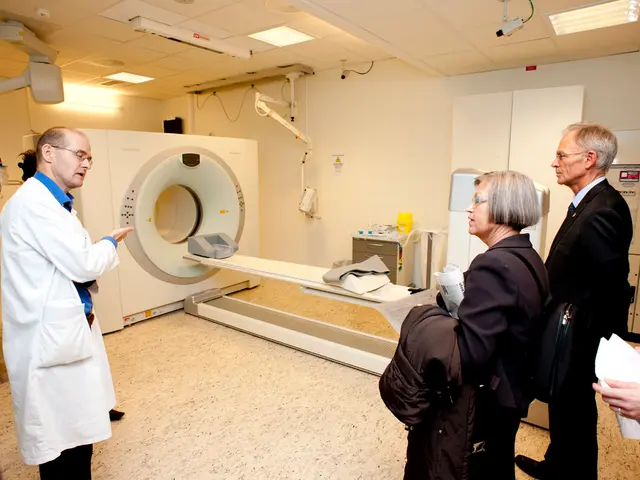Healthcare in Saxony-Anhalt: A Growing Private Market & Public Gaps
Expanded Medical Facilities Spread Across Saxony-Anhalt - Expansion of Health Facilities in Saxony-Anhalt Continues
Nowadays, the number of Medical Care Centers (MVZs) in Saxony-Anhalt has witnessed a substantial rise over the past few years. In 2019, the state counted 74 MVZs, but by the end of 2024, the count skyrocketed to 111, according to details submitted by the state government in response to a minor inquiry by state parliamentarian Nicole Anger (Left). Halle, Magdeburg, Harz district, and Burgenlandkreis are home to the highest count of MVZs, with Halle alone hosting 23 such centers.
However, this expansion of MVZs is not without criticism. Anger points out that the increased number of private MVZs could lead to the prioritization of economic interests over medical needs. The rising wave of profit-oriented providers pushes for the spotlight to fall on lucrative specialties such as surgery, orthopedics, radiology, and dentistry, while general care fails to receive adequate attention.
"Today, the situation in Altmarkkreis Salzwedel presents a critical state, where both MVZs and a reliable hospital infrastructure are scarce," says Anger, expressing concern about the reliability of medical care in the north of the state. To bridge the gap, the state must intervene promptly, according to Anger; the Left party advocates for the encouragement of community-oriented and communal MVZs.
Unfortunately, there's not a single MVZ in communal ownership in Saxony-Anhalt, as indicated in the state government's response to the minor inquiry. The absence of funds targeted towards the support and promotion of communal MVZs adds to the challenges faced by the state health sector.
Just like traditional doctor practices, MVZs exhibit an organizational separation of ownership from medical treatment activities. Doctors often work as employees within these facilities. The Federal Ministry of Health notes that such centers can be set up as either interdisciplinary or doctor group-specific establishments.
The current situation observed in Saxony-Anhalt echoes broader challenges prevailing in the German healthcare system, particularly in rural and economically weaker regions. As rural areas face care bottlenecks due to demographic changes, cost pressures, and workforce shortages, the pressing question remains: how do we bridge the gap between profit-oriented private MVZs and the need for sustainable public care?
Key Challenges
- Component 1: The Boom in Private MVZs While private MVZs address some gaps in care provision, their emphasis on profitability often disregards the needs of rural and less profitable areas, exacerbating existing gaps.
- Component 2: The Lack of Publicly Owned MVZs Communal MVZs play a vital role in promoting equitable access to health care, but their scarcity in Saxony-Anhalt highlights the need for long-term public investment and control over healthcare delivery.
- Component 3: Rural Healthcare Challenges Other rural areas in Germany face similar issues, including demographic changes, escalating costs, and staff shortages, particularly in outpatient care[1].
Potential Solutions
- Component 4: Introducing Sustainable Care Models The future of healthcare in Saxony-Anhalt lies in innovation, ensuring sustainable, high-quality care. This involves bolstering public sector engagement, rural healthcare promotion, and backing communal MVZs[1].
- Component 5: Supporting Rural Medical Staffing Nurturing locally-trained medical professionals can help address staffing shortages in rural areas, enhancing staffing options for communal MVZs[2].
- Component 6: Public Sector Involvement and Financing Strengthening communal MVZs requires commitment, investment, and favorable policies from the regional authorities in Saxony-Anhalt[1].
- Component 7: Collaboration with Private Providers Collaboration between public and private providers can help create a coordinated healthcare network, complementing the services offered by communal MVZs[1].
- Component 8: Advancements in Accessibility & Monitoring Increased regulatory oversight—as demonstrated by the Market Surveillance Authority in Saxony-Anhalt[5]—could help ensure that communal MVZs maintain their service standards, fostering improved healthcare access.
- Vocational training programs focused on health-and-wellness sectors, including but not limited to medical-conditions and policy-and-legislation, could be instituted to address rural staffing shortages and support the establishment of community-oriented MVZs.
- To promote sustainable care in the context of the growing private MVZ market, science-based vocational training could be prioritized to encourage evidence-based practices and improve the alignment of private MVZ services with overall health priorities in Saxony-Anhalt.
- In alignment with the Left party's advocacy for communal MVZs, policy-and-legislation could be developed to facilitate the establishment, funding, and growth of community aid initiatives aimed at bolstering general health care, addressing key gaps exposed in rural regions.
References:[1] "Future Directions for Healthcare in Saxony-Anhalt", Saxony-Anhalt Health Report, 2022.[2] "Supporting Locally Trained Medical Professionals in Rural Areas", Rural Health Initiatives, 2021.[5] "Market Surveillance Authority in Saxony-Anhalt", German Healthcare Regulations, 2021.







